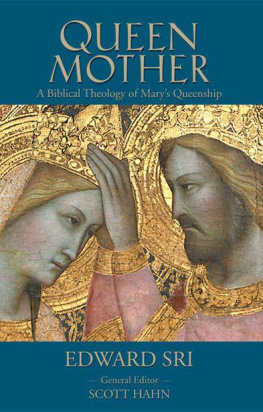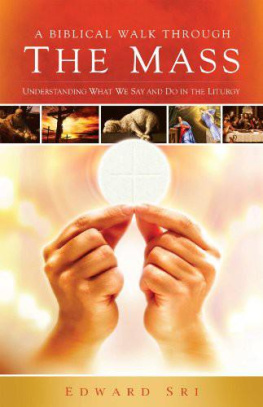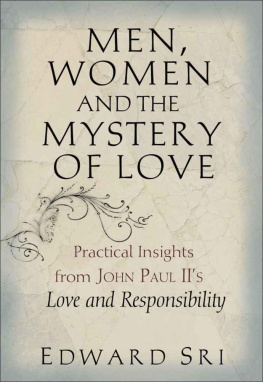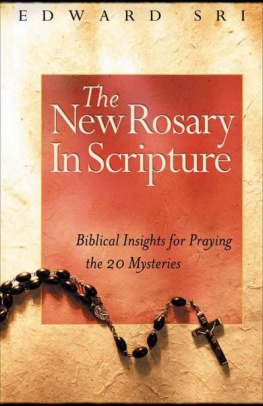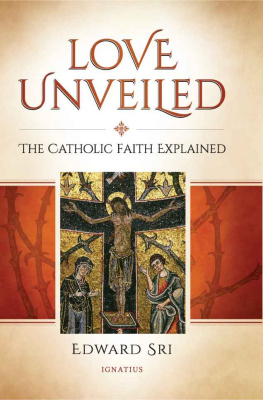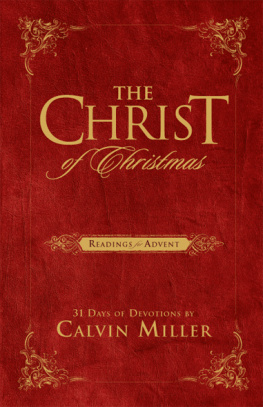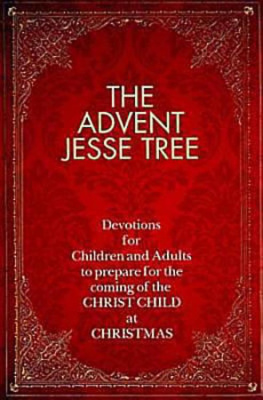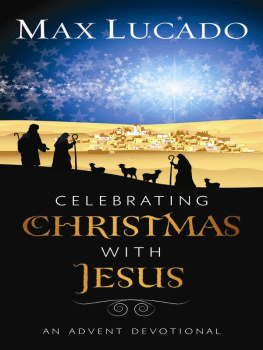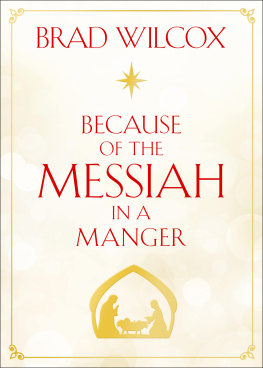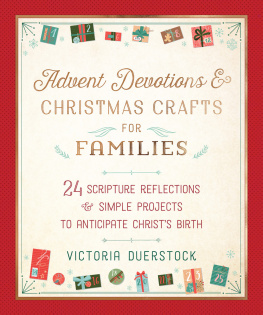The Advent of Christ
Scripture Reflections to Prepare for Christmas
Edward Sri
Copyright
Scripture passages have been taken from the Revised Standard Version , Catholic edition. Copyright 1946, 1952, 1971 by the Division of Christian Education of the National Council of Churches of Christ in the USA. Used by permission.
All rights reserved. Quotes are taken from the English translation of the Catechism of the Catholic Church for the United States of America (indicated as CCC ), 2nd ed. Copyright 1997 by United States Catholic Conference
Libreria Editrice Vaticana.
These reflections are based on Edward Sri, Dawn of the Messiah: The Coming of Christ in Scripture (Cincinnati: Servant, 2005). All rights reserved.
Library of Congress Cataloging-in-Publication Data
Sri, Edward P.
The advent of Christ : scripture reflections to prepare for Christmas / Edward Sri.
pages cm
ISBN 978-1-61636-651-3 (pbk.)
1. AdventMeditations. 2. ChristmasMeditations. 3. Jesus ChristNativityMeditations. 4. Sri, Edward P. Dawn of the Messiah. I. Title.
BV40.S65 2013
242.33dc23
2013011932
PR INT ISBN 978-1-61636-651-3
EBOOK ISBN 978-1-61636-652-0
Copyright 2013, Edward Sri. All rights reserved.
Published by Servant Books, an imprint of Franciscan Media.
28 W. Liberty St.
Cincinnati, OH 45202
www.FranciscanMedia.org
Dedication
To my son, Luke.
Contents
Introduction
Perhaps the Christmas story has become almost too familiar.
Every December we encounter the story of Christs birth in manger scenes, Christmas cards, and decorations on Christmas trees. We hear it in Scripture, sing it in carols, and see it in the paintings, statues, and stained-glass windows that decorate our churches. For many today, the basic outline of the narrative has become so familiar that the profoundindeed, shockingnature of the Christmas mystery might be overlooked. A virgin giving birth, a child laid in a manger, and shepherds greeted by angels no longer arrest our attention.
But what if we had never heard the story before? What if we were Jews in the first century who were hearing this plot for the first time? These events at the dawn of Christianity certainly would not be taken for granted. They would signal that everything our people had been longing forfor hundreds of yearswas now coming to fulfillment.
This Advent I invite you to put yourself in that first-century Jewish world and discover the spiritual treasures that are packed into practically every line and every detail of the Gospel accounts of Matthew and Luke (the two Gospels that provide the narratives about Jesuss birth). Using excerpts from my book Dawn of the Messiah, the following material bridges the gap between unfamiliar ancient Jewish themes and traditions and our contemporary understanding of familiar biblical stories. My prayer is that this Advent experience will give you new perspective about the dawn of the Messiahthe Advent of Christ!
Week One: Setting the Stage: The Prophecies and the Hope
It has been said that Luke begins his Gospel like a good Shakespearean play: with a pair of minor characters who prepare the way for the lead roles to take the stage. Before the main drama surrounding Joseph, Mary, and Jesus begins, the first scene in the Gospel of Luke introduces us to an important supporting cast: Zechariah and Elizabeth, an older Jewish couple who are about to be caught up into Gods plan of salvation in a way they probably never imagined.
Zechariah and Elizabeth stand out as a couple with high credentials in first-century Judaism. With Zechariah serving as a priest, and his wife also coming from the priestly family of Aaron, they would hold a position of great respect. Luke, furthermore, goes out of his way to emphasize that they are both righteous before God and even blameless in following all Gods commands.
That is why the next statement would be so shocking to Jewish minds: But they had no child, because Elizabeth was barren, and both were advanced in years (Luke 1:7). Barrenness was often considered shameful in Judaism. It was even seen in some cases as evidence of Gods punishment (see Deuteronomy 28:15, 18). So this statement introduces us to a tension between this couples holiness on one hand and their childlessness on the other. Elizabeth waits for God to act in her life. And the reader of Lukes Gospel also waits to see how this tension will be resolved.
The Gospel of Matthew starts in a very different way. Matthew begins the story of Jesus with a long genealogy. It seems like the dullest of introductions: a list of forty-seven names. But for the Jews living in the first century, each name told a story and recalled important places, events, and periods in Israels history. As we journey through this genealogical summary of Israels history, we will see how Matthew strategically shows that Gods plan for Israel is reaching its climax.
During this first week of Advent, the stage is being set for the greatest drama of all time.
Sunday: The New Elijah
But the angel said to him, Do not be afraid, Zechariah, for your prayer is heard, and your wife Elizabeth will bear you a son, and you shall call his name John.
And you will have joy and gladness,
and many will rejoice at his birth.
Luke 1:1314
What is most interesting about this scene is not simply that Zechariah and Elizabeth finally will be blessed with a child. This child will bring blessings not only to his parents but to all of the people, for John the Baptist will be one of the most important prophets ever sent to Israel. Let us consider three amazing things the angel tells Zechariah about this child.
First, he will not consume wine or strong drink (v. 15). In the Old Testament, Nazirites consecrated themselves to God by a vow and separated themselves from normal life. Abstaining from alcohol was a common practice for the Nazirites (see Numbers 6:3; Judges 13:4). So this fact about John the Baptist indicates that he will be set apart for some special service for the Lord, like a Nazirite.
Second, the angels description of the childs being filled with the Holy Spirit, even from his mothers womb (v. 15) tells us about the kind of service for which John is destined: He will be a prophet . It was the Spirit descending on Saul who transformed him into a prophet (see 1 Samuel 10:10), and it was the Spirit of the Lord who spoke through David so that Gods Word would be upon his tongue (see 2 Samuel 23:2). It was this same Spirit who came upon the prophets Ezekiel, Elijah, and Elisha during their ministry in Israel (see Ezekiel 11:5; 2 Kings 2:916; see also Joel 2:28). The child being filled with the Holy Spirit indicates that John, too, will be a prophet.
Third, the importance of Johns prophetic ministry is seen in the final words that the angel uses to describe this child:
He will go before him in the spirit and power of Elijah,
to turn the hearts of the fathers to the children,
and the disobedient to the wisdom of the just,
to make ready for the Lord a people prepared. (Luke 1:1617)
These verses echo the last prophetic words of the Old Testament, where Malachi announces that the Lord one day would come to redeem Israel and that he would send his messenger to prepare the people for his arrival (see Malachi 3:1), and this messenger would be like a new Elijah: Behold, I will send you Elijah the prophetand he will turn the hearts of fathers to their children and the hearts of children to their fathers (Malachi 4:56). In light of this Old Testament background, the angel describes Johns ministry as the fulfillment of Malachis prophecyhe will be the new Elijah, preparing the people of Israel for the Lords coming, which will bring about the reconciliation of families to God and families to each other.
Next page

